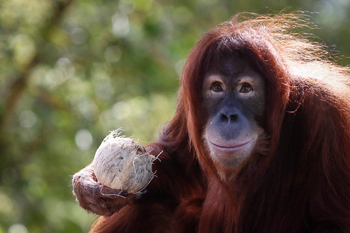Washington, Jan 19: Majority of the non-human primates in the world - the apes, monkeys and lemurs - inhabiting the ever-shrinking forests of our planet face a grim future, with about 60 per cent of them at the brink extinction, according to a new study.
 "This truly is the eleventh hour for many of these creatures," said Paul Garber, professor at University of Illinois in the US.
"This truly is the eleventh hour for many of these creatures," said Paul Garber, professor at University of Illinois in the US.
"Several species of lemurs, monkeys and apes - such as the ring-tailed lemur, Udzunga red colobus monkey, Yunnan snub-nosed monkey, white-headed langur and Grauer's gorilla - are down to a population of a few thousand individuals," said Garber.
"Alarmingly, about 60 per cent of primate species are now threatened with extinction and about 75 per cent have declining populations," researchers said.
"In the case of the Hainan gibbon, a species of ape in China, there are fewer than 30 animals left," he said.
Another critically endangered ape, the Sumatran orangutan, lost 60 per cent of its habitat between 1985 and 2007, Garber said.
These species face a host of threats, from hunting, the illegal pet trade and habitat loss as humans continue to log tropical forests, build roads and mine "in needlessly destructive and unsustainable ways," Garber said.
"These primates cling to life in the forests of countries such as China, Madagascar, Indonesia, Tanzania and the Democratic Republic of Congo," he said.
"Sadly, in the next 25 years, many of these primate species will disappear unless we make conservation a global priority," he said.
Just four countries - Brazil, Indonesia, Madagascar and the Democratic Republic of Congo - host two-thirds of all species of primates, researchers said, making these countries obvious targets for measures to halt - and perhaps even reverse - the global primate extinction trend.
Habitat loss as the result of road building, mining, logging and agriculture, along with hunting and illegal trade in animals and animal parts, is often tied to high rates of population growth and the poverty of communities living nearby, Garber said.
"Addressing local poverty and easing population growth is a necessary component of primate conservation," he said.
"Building economies based on the preservation of forests and their primate inhabitants, and broadening educational opportunities for women would begin to address some of the greatest threats to these animals," he said.
Of all the threats, however, the biggest is humanity's swelling agricultural footprint, Garber said. "Agricultural practices are disrupting and destroying vital habitat for 76 per cent of all primate species on the planet," he said.
"In particular, palm oil production, the production of soy and rubber, logging and livestock farming and ranching are wiping out millions of hectares of forest," he said.
The study was published in the journal Science Advances.





Comments
Add new comment